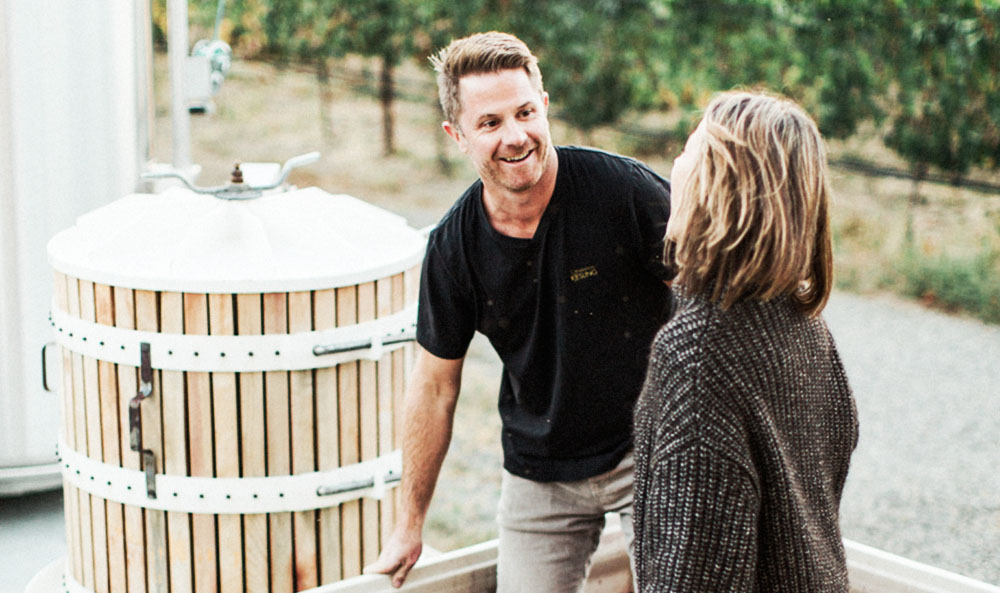Master of Wine to Winemaker: Q&A with Rhys Pender MW

Australian-born, BC-based Rhys Pender MW has an insatiable passion for wine. It shows in the accreditation he’s achieved – the full run of the Wine and Spirits Education Trust (WSET) followed by the big kahuna of wine knowledge – Master of Wine (MW). When he reached MW status, he was one of the youngest to have done so; even today, he’s one of only five Canadians to boast the MW following their name.
Pender and his wife, Alishan Driediger, own Little Farm Winery in Similkameen/Cawston, British Columbia. This small-batch winery uses only four acres of vines to produce limited quantity, quality BC wines. Their annual yield in 2016, for example, was 1,100 cases – and Pender hopes to keep yields around 1,000 cases for the foreseeable future.
The journey from teenage Australian liquor store clerk to BC winemaker has been a twisty one with a few stops. First, Europe, for school (where he met Driediger); then Kelowna, BC (presumably following Driediger back to her hometown… I may be romanticizing this a bit!). The couple explored food and wine together. He studied wine, getting his WSET and MW designations, wrote about wine, taught at WSET and created WinePlus, a wine company created to further the enjoyment of wine through education. She became a highly accomplished baker, founded Okanagan Grocery and completed her winemaking diploma. They bought Little Farm Winery in 2008, releasing their first vintage in 2011.
I had the opportunity to pick Pender’s brain about his experiences and the switch from wine-tasting expert to wine producer.
LH: Why did you become a Master of Wine?
RP: I started taking the WSET classes after getting interested in wine during chef training in 1998. And I just became so interested in wine that I did all the WSET levels and could not stop wanting to learn, so went on to do the Master of Wine.
LH: Why did you choose the Similkameen/Cawston for your winery?
RP: I was living in Peachland and with two young kids we had grown out of our 800 square foot house so we needed to move. Cawston had the magic combination of outstanding wine potential and much more affordable pricing than the Okanagan.
LH: Which grapes do you like to work with?
RP: Riesling and Chardonnay are what is planted at Little Farm’s Mulberry Tree Vineyard. These grapes are great at showing their terroir and can make the most complex, intense and best quality white wines in the Okanagan and Similkameen regions.
LH: Why is small batch winemaking important?
RP: My wife and I like to do everything ourselves as much as we can. Being hands on allows us to do everything exactly how we want it to be done and I think helps with the quality.
LH: Would you ever expand to produce more?
RP: Our goal is to stay around 1,000. If we go bigger then we lose that control we are trying to keep.
LH: What makes single vineyard wine so appealing?
RP: I love when wines taste of a place. In both the Riesling and Chardonnay from our Mulberry Tree Vineyard, there is this amazing stony, salty, minerality that comes on the finish. It is from the high levels of calcium carbonate in the soil. It is amazing when the place transcends the grape variety. As long as heavy handed winemaking doesn’t obliterate any sense of place.
LH: What does it mean to make wines with minimal manipulation? Why choose this direction?
RP: So often wines taste more of the winemaker and the manipulations they have applied to the wine. We want to make wines that show where they are from, a true reflection of the grape, the vineyard, the vintage and allowing that to all come through without being hidden under manipulative techniques that make a wine less real.
